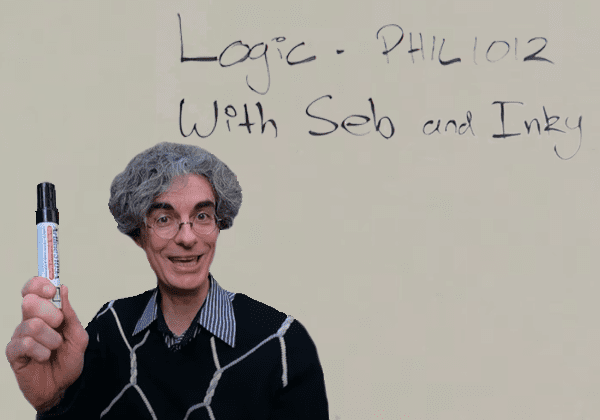In 2021, a new form of Beatlemania appears to be sweeping through the University of Sydney! But rather than chasing after young rock stars, these students appear to be chasing a new type of knowledge, exchanging their CDs for textbooks as they take on PHIL1012: Introductory Logic.
It may seem an exaggeration to compare a first year philosophy course to such a form of passionate fanaticism, but the numbers say otherwise. Originally designed by Professor Nicholas Smith, PHIL1012 has never failed to attract a faithful glut of students to its lecture theatres. But the steady ascent in enrolments over the past five years has hit an all-time high in 2021, with over 2200 students currently taking the course. This is not just a record for the Philosophy Department itself, but a University-wide record for enrolment numbers in a single Arts and Social Sciences course.
But what even is ‘logic’?
In basic terms, it is a branch of philosophy that investigates the laws of truth. Students of logic are versed in the language of good reasoning, and taught how to construct arguments that are considered valid, using techniques that include, but are not limited to, truth trees, models and truth tables. In this way, logic probably defies the mainstream view of a philosophy class, as lengthy essays are traded for problem sets, seemingly limitless theories are transferred into concise formulas, and perhaps the greatest insult is being told that what you’ve just said is a logical fallacy.
But in a world where students are increasingly hesitant about doing maths, and often intimidated by the perceived complexity of the ideas at the heart of philosophy, why is it that a subject that combines both of these fields is proving to be so popular?
For those majoring in philosophy, the answer is simple. Logical reasoning is a vital philosophical skill that is honed and revisited time and time again throughout one’s degree progression. But for those participating in PHIL1012 as an elective, like more than 80% of the current attendees, there is still no shortage of reasons as to why the course is valuable. For one thing, logic teaches skills that are directly transferable to the study of mathematics, computing, linguistics, even legal-reasoning. But in a broader sense, the focus on argument construction at the core of the study of logic equips students with skills that enable them to more clearly and critically interrogate complex ideas posed in a variety of contexts. After all, discussions about whether an idea is true or false, reasonable or unreasonable, appear as much in the wider world as they do in a philosophy class.
But the beating heart of PHIL1012 at the University of Sydney is undeniably the lecturer who has been at the helm of the ship since 2017: Sebastian Sequoiah-Grayson. Seb has established something of a cult following at the University, with students on the USyd Rants Facebook page crowning him “the king of philosophy” and “the single greatest lecturer at USyd”. With his trusty sidekick Inky (a very intelligent whiteboard marker), Seb effortlessly transforms ideas that are opaque and complex into lectures that are clear, insightful, and astonishingly entertaining. This skill is not only incredibly rare among educators who are tasked with covering such complex material, but is one that is routinely lauded by students who have taken his courses.
Stuart Rich, an Introductory Logic student in 2020 commented:
“Seb’s universally beloved first-year unit, PHIL1012: Introductory Logic, was absolutely crucial to my intellectual development, as it continues to be for that of the thousands of students who take the unit every year.
Seb is a gifted, generous educator and his credentials are unmatched. He won every award imaginable as an undergraduate, completed his PhD at the most prestigious philosophy department in the world, has received nothing but universal praise for his teaching, and is conducting some of the most important and trailblazing research in analytic philosophy today. The Philosophy department is truly lucky to have him.”
Dominic Bùi Việt, a third year Philosophy of Information student in 2020, added:
“My big take away from being in Seb’s class was his sheer pedagogical skill. The course was an absolute standout for me, which owing to my lack of fluency in philosophical theory, I didn’t expect.”
For the first time in five years, Seb is not lecturing Introductory Logic alone. This semester, he is joined by Dr Michael Andrew Nielsen and Professor Nicholas Smith, who is also the author of the textbook, The Laws of Truth, that is used in the course. They are valiantly supported by a small army of passionate tutors, who are responsible for 92 tutorials, all of which are currently taking place online.
Whether one looks at the disparaging language of the government’s 2020 ‘Job-Ready’ Graduates Package, or the University’s increasing dependency upon less interactive, online modes of teaching, the past couple of years have made it seem like humanities education in Australia has no future. However, PHIL1012: Introductory Logic emerges from the rubble as one of the success stories. Seb, Inky and the PHIL1012 team do not only exemplify the enduring value of philosophy, but more profoundly highlight that no amount of rhetoric or adversity can counter the immense value of exceptional educators.
Editor’s note: This article was updated on 10 September to reflect that MATH1002 had 2800 enrolments in Semester 1 2021, and that PHIL1012 enrolments are an Arts and Social Sciences faculty record.





